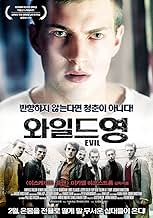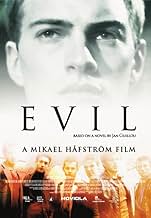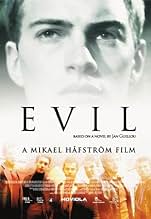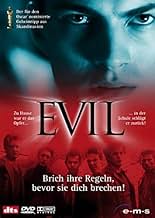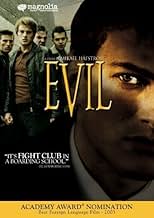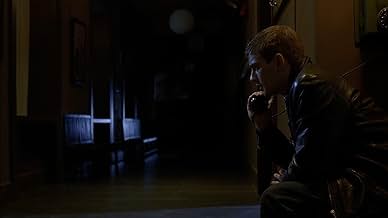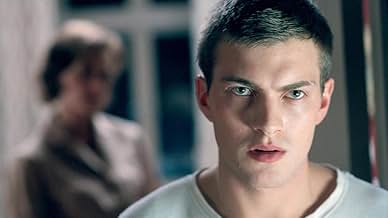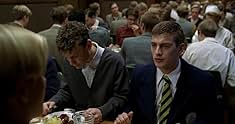IMDb रेटिंग
7.7/10
44 हज़ार
आपकी रेटिंग
अपनी भाषा में प्लॉट जोड़ेंA teenage boy expelled from school for fighting arrives at a boarding school where the systematic bullying of younger students is encouraged as a means to maintain discipline, and decides to... सभी पढ़ेंA teenage boy expelled from school for fighting arrives at a boarding school where the systematic bullying of younger students is encouraged as a means to maintain discipline, and decides to fight back.A teenage boy expelled from school for fighting arrives at a boarding school where the systematic bullying of younger students is encouraged as a means to maintain discipline, and decides to fight back.
- 1 ऑस्कर के लिए नामांकित
- 9 जीत और कुल 10 नामांकन
फ़ीचर्ड समीक्षाएं
I have lately been trawling through Swedish movies, in an effort to watch as many as I can. I have not yet come across one that I didn't at least appreciate. The Scandinavians are remarkable story-tellers, and can teach the rest of the world a thing or two about good story-telling in film. What surprises me the most is why it is the rest of the world does not know about and applaud this film. As an examination of bullying and abuse it is extraordinary.
"Ondskan" is the story of one teenage boy's experiences of bullying - both as a perpetrator and also from the receiving end - firstly at the hands of his bitter & twisted stepfather, then in the school-yard at his high school, and lastly at an exclusive boarding school to which he is sent by his mother. It is a highly charged movie, and will be too much for some more sensitive viewers, but tells a very important story of how it is bullying is perpetrated, justified, institutionalised, and then passed on so that the behaviour continues.
There is little to place this story in an historical context other than the music and the rather odd dress of the late 1950's. The culture of the school to which Erik Ponti is sent is one in which the members of the Council - the Boss Boys - ritually bully the younger boys, and the school staff turn a blind eye. To fight back by striking a Council member is to invite expulsion, and Erik cannot risk this. Andreas Wilson has a strong presence, and is believable as Erik, and Henrik Lundstrom, who plays the sensitive Pierre, is worthy of mention also. I came across this movie because I was searching for movies featuring Gustaf Skarsgard. In "Ondskan" Skarsgard plays the student we all want to hate - the top bully - and he does it well. Later in the movie we are given a brief insight into what drives him, and the degree of pain he experiences on a daily basis. Great writing!!
The only real gripe I had while watching this film was the swimming style of Erik's character. He was meant to be a top swimmer, and yet while doing freestyle his arms barely managed to get out of the water. With a swimming stroke like that he'd never make it to be top swimmer at any school. Picky, I know, but it bothered me.
If I could give this film 12 stars I would.
"Ondskan" is the story of one teenage boy's experiences of bullying - both as a perpetrator and also from the receiving end - firstly at the hands of his bitter & twisted stepfather, then in the school-yard at his high school, and lastly at an exclusive boarding school to which he is sent by his mother. It is a highly charged movie, and will be too much for some more sensitive viewers, but tells a very important story of how it is bullying is perpetrated, justified, institutionalised, and then passed on so that the behaviour continues.
There is little to place this story in an historical context other than the music and the rather odd dress of the late 1950's. The culture of the school to which Erik Ponti is sent is one in which the members of the Council - the Boss Boys - ritually bully the younger boys, and the school staff turn a blind eye. To fight back by striking a Council member is to invite expulsion, and Erik cannot risk this. Andreas Wilson has a strong presence, and is believable as Erik, and Henrik Lundstrom, who plays the sensitive Pierre, is worthy of mention also. I came across this movie because I was searching for movies featuring Gustaf Skarsgard. In "Ondskan" Skarsgard plays the student we all want to hate - the top bully - and he does it well. Later in the movie we are given a brief insight into what drives him, and the degree of pain he experiences on a daily basis. Great writing!!
The only real gripe I had while watching this film was the swimming style of Erik's character. He was meant to be a top swimmer, and yet while doing freestyle his arms barely managed to get out of the water. With a swimming stroke like that he'd never make it to be top swimmer at any school. Picky, I know, but it bothered me.
If I could give this film 12 stars I would.
I wonder, as I write this, why a film like Ondskan hasn't received commercial distribution in the States. Perhaps distributors assume Americans are too removed from the world of mid-century upper class boy's boarding schools in Sweden to relate to the film, which is our loss. Ondskan presents a microcosm of cruelty, status, and one-upsmanship - one might say evil - that exists in such an institution. Every year we read another horror story of a hazing gone too far. Children trounce their playmates. There's plenty of physical aggression among boys. The latest discussion concerns what among girls is called relational aggression, in which an individual is harmed through the hurtful manipulation of peer relationships and/or their friendships. .Neal LaBute has taken the idea of sadistic relationships to the American workplace in 'In the Company of Men' and to the suburbs in 'Your Friends and Neighbors'. There have certainly been other films tackling this particularly subject of sadism in boarding schools, Young Torless (Der Junge Törless) in 1966, comes especially to mind. What is captivating about Ondskan ('Evil') is both cinematic and psychological. The world of this o-so reputable boys school is painted in earth tones and fine wood with muted light rendering its cold emotions. The set design by Anna Asp (who's has done some other great looking films) lets us feel as though we have lived in this space. The lead character, Erik Ponti, at first we think will be the embodiment of the 'evil' of the title. He is regularly and systematically strapped by his stepfather. He transfers that frustration to his own classmates, which is what gets him sent to the boarding school in question. There he is ritually brutalized by the upperclassmen, which is, we are led to understand, the expected behavior in this hierarchy. To the administration and faculty this is apparently part of school tradition. Eric's initial unwillingness to fight back, despite a similar unwillingness to bend to arbitrary, sadistic, and unwritten rules, is relentlessly frustrating. As an audience we really want him to act. But his honor, his fortitude, and the fact his mother has hocked some heirlooms to pay tuition, keep him from lashing back. We are thus submitted to the same unremitting abuses with no real payoff. I will refrain from revealing the end, but it is not when or what you might expect. The result is a great ride and an elating experience. The audiences at Harvard, where I saw the film, applauded afterward. It's not a perfect film. There are clichés and expected set-ups. Still the mushy adolescence of the actors cast in these parts is consistently smart. The music is tasteful and well used. The direction is subtle and the violence is felt more than seen, but when it happens it is as ugly as it deserves to be.
Erik Ponti(Andreas Wilson) is a young trouble maker who is constantly abused by his stepfather and often ignored by his mother. After a fight in his school, Eric gets enrolled in a boarding school by his mother. At the new school, Erik only makes one good friend Pierre(Henrik Lundström) but their lives slowly start falling apart when the older boys from the school make a pact to make Erik's life a living hell. This was a very gripping and disturbing movie. I saw this at the Vancouver Film Festival and enjoyed it quite a lot. Andreas Wilson is a gorgeous and talented young man and I hope he becomes big someday. I would give Ondskan or also known as "Evil" 8/10.
Imagine the schoolboy sadism of Der Junge Törless (1966), the anarchism of If... (1968), with just a dash of the old school bullying of Tom Brown's School Days, and you get something of the flavour of Evil, which sets its student angst in 1950s' Scandinavia. Ironically for a film that will end up on a relatively pacifist message, it starts with a punch up as the rowdy hero Erik (Andreas Wilson), thrashed by his unpleasant step father at home, duly takes it out on another student at his current school - only to be summarily expelled on the basis of his continuing bad behaviour. Dubbed 'evil' by the headmaster at his disciplinary hearing Erik appears, at least at first sight, to be irredeemably bad. Surly and uncommunicative, a trait he only gradually overcomes, he's a disruptive influence. One measure of the film's success is how it will show a growing moral dimension to this truculent and uncooperative personality, the once-bad boy quickly maturing before our eyes. It will also show how being a 'disruptive' influence can ultimately be a positive, just as much as a negative, force in a closed society. But meanwhile Erik's long suffering mother packs him off at short notice to Stjansberg, an exclusive boarding school where, we are told, are moulded generations of Swedish 'supermen'.
Adapted from a bestselling novel based on painful reminiscence, Evil is praised in interview on the disc by the author for its 'journalistic accuracy' in recreating events. It's a fact that makes the environment in which a more subdued Erik finds himself all the more chilling and depressing. For Stjansberg is a school where the teachers believe in leaving students to their own devices outside of classes, a place where enthused with an ethos of alleged 'team spirit' the system of discipline and punishment is arbitrary, prejudiced against the weak or different, and where elements of fascism still lurk within the teaching profession. Despite its regimentation and strict codes, Erik soon discovers that "there's no honour in (the) school - only ways of making it hell," while eventually realising that "what separates men from animals is not only intelligence, it's morality." Set on a painfully steep learning curve, he makes friends with the best student in the school (his roommate), and while remembering his promise to his mother, struggles to stay out of trouble. Erik's painful introspection at this point recalls that of Jim Stark in Rebel Without A Cause (1955) another film in which a troubled male youngster forms an alliance with a weaker soul (Sal Mineo's 'Plato') while in moral agony over conflicting impulses.
Erik may suddenly be concerned to stay out of conflict, but his refusal to compromise a newfound dignity and moral superiority quickly brings him up against Silverstein, the Flashman figure of the piece who, as a the most visible representation of the fascist strain that permeates the school has "to be fought, now and forever." What infuriates the bullies at the school no end is Erik's unexpected - and, in the light of what we have seen of him previously, uncharacteristic - refusal to fight. Instead he maintains a quiet mocking stoicism, bearing glumly, at least to a point, the institutionalised humiliation heaped upon him. Like Gandhi, a name associated with a philosophy of peaceful protest and civil disobedience (and who is specifically invoked at one point in the film) Erik's mature response to provocation is hard earned, but grows increasingly effective.
Wilson is excellent as the put upon student, although from such a physical person one might have wished more passion in his liaison with Marja, the young woman from the kitchen(Linda Zilliacus), who tacitly supports his tactics. In fact, this affair proves to be Erik's Achilles' heel, and the events leading on from it form the real climax of the picture. So much of Evil has been outstanding and intriguing to this point that it's a shame that the conclusion of the piece, springing so readily from a plot 'plant' earlier in the story, is a little too pat. From the interviews on the R2 DVD the viewer learns that, in real life, the school in question was brought to book by eventual and unwelcome media exposure prompted by the author. Whether or not it was achieved so easily as is suggested by the movie is a moot point, but the convenient threat of sensational journalism, easily obtainable and brought down upon the head of a palpable corrupt and unfair system is too much of let off, at least to this viewer, as well a cliché of a sort, not to pass un-remarked. One imagines that the scene of an arrogant headmaster made to eat humble pie dramatically was too irresistible to exclude, but I sensed here that such a moment was an easy way out.
With this hesitation, one can recommend the film thoroughly, being both excellently shot and acted as well as making an important statement of its own. Rather amusingly in the accompanying DVD material is a comment from one of the principals, that they didn't want it to be "a Dogme film, a small film that no one cares about, we want(ed) it to be a stylish, big, expensive, heavy, good film." It's an ironic remark as, arguably, a stricter and more rigorous approach to the story, familiar from Van Trier and colleagues, would have led to some fascinating dividends especially in the presentation of such stark material. Fortunately filmic conservatism also pays off when the results are so sincere and full of verisimilitude as here, and with a cast who fit their roles like a glove and, as a film with an 'old fashioned' humanistic message about standing out against the evils of totalitarianism in a closed society, the message is as relevant as ever. In short I doubt whether another 'school film' as fine as this will come along for some time, and so seek it out.
Adapted from a bestselling novel based on painful reminiscence, Evil is praised in interview on the disc by the author for its 'journalistic accuracy' in recreating events. It's a fact that makes the environment in which a more subdued Erik finds himself all the more chilling and depressing. For Stjansberg is a school where the teachers believe in leaving students to their own devices outside of classes, a place where enthused with an ethos of alleged 'team spirit' the system of discipline and punishment is arbitrary, prejudiced against the weak or different, and where elements of fascism still lurk within the teaching profession. Despite its regimentation and strict codes, Erik soon discovers that "there's no honour in (the) school - only ways of making it hell," while eventually realising that "what separates men from animals is not only intelligence, it's morality." Set on a painfully steep learning curve, he makes friends with the best student in the school (his roommate), and while remembering his promise to his mother, struggles to stay out of trouble. Erik's painful introspection at this point recalls that of Jim Stark in Rebel Without A Cause (1955) another film in which a troubled male youngster forms an alliance with a weaker soul (Sal Mineo's 'Plato') while in moral agony over conflicting impulses.
Erik may suddenly be concerned to stay out of conflict, but his refusal to compromise a newfound dignity and moral superiority quickly brings him up against Silverstein, the Flashman figure of the piece who, as a the most visible representation of the fascist strain that permeates the school has "to be fought, now and forever." What infuriates the bullies at the school no end is Erik's unexpected - and, in the light of what we have seen of him previously, uncharacteristic - refusal to fight. Instead he maintains a quiet mocking stoicism, bearing glumly, at least to a point, the institutionalised humiliation heaped upon him. Like Gandhi, a name associated with a philosophy of peaceful protest and civil disobedience (and who is specifically invoked at one point in the film) Erik's mature response to provocation is hard earned, but grows increasingly effective.
Wilson is excellent as the put upon student, although from such a physical person one might have wished more passion in his liaison with Marja, the young woman from the kitchen(Linda Zilliacus), who tacitly supports his tactics. In fact, this affair proves to be Erik's Achilles' heel, and the events leading on from it form the real climax of the picture. So much of Evil has been outstanding and intriguing to this point that it's a shame that the conclusion of the piece, springing so readily from a plot 'plant' earlier in the story, is a little too pat. From the interviews on the R2 DVD the viewer learns that, in real life, the school in question was brought to book by eventual and unwelcome media exposure prompted by the author. Whether or not it was achieved so easily as is suggested by the movie is a moot point, but the convenient threat of sensational journalism, easily obtainable and brought down upon the head of a palpable corrupt and unfair system is too much of let off, at least to this viewer, as well a cliché of a sort, not to pass un-remarked. One imagines that the scene of an arrogant headmaster made to eat humble pie dramatically was too irresistible to exclude, but I sensed here that such a moment was an easy way out.
With this hesitation, one can recommend the film thoroughly, being both excellently shot and acted as well as making an important statement of its own. Rather amusingly in the accompanying DVD material is a comment from one of the principals, that they didn't want it to be "a Dogme film, a small film that no one cares about, we want(ed) it to be a stylish, big, expensive, heavy, good film." It's an ironic remark as, arguably, a stricter and more rigorous approach to the story, familiar from Van Trier and colleagues, would have led to some fascinating dividends especially in the presentation of such stark material. Fortunately filmic conservatism also pays off when the results are so sincere and full of verisimilitude as here, and with a cast who fit their roles like a glove and, as a film with an 'old fashioned' humanistic message about standing out against the evils of totalitarianism in a closed society, the message is as relevant as ever. In short I doubt whether another 'school film' as fine as this will come along for some time, and so seek it out.
This is a great film. Truly outstanding. The characters are real and the story, however farfetched, rings true to life. Particularly enjoyable is the internal fight that transforms Erik from an angry youth to a man. And who could forget Andears' handsome good looks?!? Watch out Hollywood! Better prepare for the Swedish invasion! If you have the opportunity to see this film, do. It's well worth your time and money.
क्या आपको पता है
- ट्रिवियाThe movie is based on a novel by Jan Guillou. Guillou attended a boarding school himself when he was a teenager and the novel is partly based on his own experiences.
- गूफ़It is sometime after Christmas when Erik is trying to see the Finnish girl for the last time but there are yellow and falling leaves visible behind him.
- भाव
Headmaster: There is only one word for people like you, and that is "evil"
- कनेक्शनFeatured in The 76th Annual Academy Awards (2004)
- साउंडट्रैकStupid Cupid
Written by Howard Greenfield (as Greenfield) and Neil Sedaka (as Sedaka)
Performed by Connie Francis
With the kind permission of Warner/Chappell Music Scand.AB and Universal Music AB
टॉप पसंद
रेटिंग देने के लिए साइन-इन करें और वैयक्तिकृत सुझावों के लिए वॉचलिस्ट करें
- How long is Evil?Alexa द्वारा संचालित
विवरण
- रिलीज़ की तारीख़
- कंट्री ऑफ़ ओरिजिन
- आधिकारिक साइट
- भाषाएं
- इस रूप में भी जाना जाता है
- Evil
- फ़िल्माने की जगहें
- उत्पादन कंपनियां
- IMDbPro पर और कंपनी क्रेडिट देखें
बॉक्स ऑफ़िस
- बजट
- SEK 2,20,00,000(अनुमानित)
- US और कनाडा में सकल
- $15,530
- US और कनाडा में पहले सप्ताह में कुल कमाई
- $2,448
- 12 मार्च 2006
- दुनिया भर में सकल
- $5,28,245
- चलने की अवधि
- 1 घं 53 मि(113 min)
- रंग
- ध्वनि मिश्रण
- पक्ष अनुपात
- 1.85 : 1
इस पेज में योगदान दें
किसी बदलाव का सुझाव दें या अनुपलब्ध कॉन्टेंट जोड़ें






